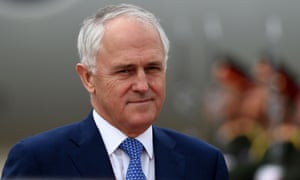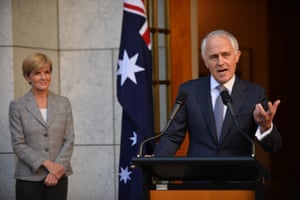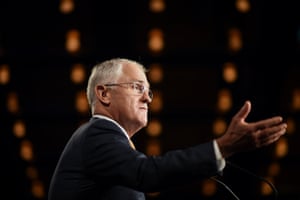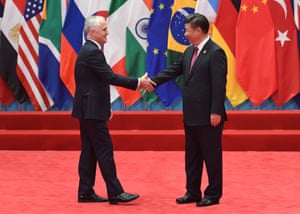Extract from The Guardian
A year since he toppled
Tony Abbott, the PM must negotiate land mines and contingencies
everywhere, plus enemies inside the party and out

After just one year in the job, an Australian
prime minister in normal circumstances would be entitled to feel that
there wasn’t a sense of semi-permanent contingency. No such luxury
for Malcolm Turnbull. Photograph: Ye Aung Thu/AFP/Getty Images
Contact
author
Friday
9 September 2016 16.52 AEST
Malcolm
Turnbull had a terrible opening to the new parliament.
Pretty much everything went south.
The
prime minister had a better week this week. He could enjoy being out
of the Canberra crucible in
full geopolitical flight, happy in summit mode, and he could
enjoy the spectre of Sam
Dastyari’s imbroglio, an opposition imbroglio, rather than an
imbroglio of his own – a moment of pure refreshment.
Malcolm
Turnbull shakes hands with China’s President Xi Jinping at the G20.
Photograph: Greg Baker/AFP/Getty Images
But
there’s no avoiding a return to the political fray.
Turnbull’s
plane will thud down on the tarmac at midnight on Saturday.
The
upcoming week marks not only the resumption of the parliamentary
sitting but the anniversary of Turnbull’s first year as prime
minister. Milestones inevitably prompt reflection and analysis, and
doubtless we’ll see a lot of it over the coming days.
After
just one year in the job, an Australian prime minister in normal
circumstances would be entitled to feel that the clock wasn’t
always ticking, that there wasn’t a sense of semi-permanent
contingency.
But Australian
politics hasn’t been normal for quite some time, and
sometimes it’s hard to see when or if it will ever be normal again.
Right
now, it is line ball whether the prime minister will survive in the
job long enough to see another election. His
enemies are massing in plain sight, not even bothering to be
covert in order to afford him a measure of dignity.
The Coalition remains
philosophically riven along the widest spectrum of representation
we’ve seen in the federal parliament in a generation, perpetuating
an internal dynamic of rolling contest and contention, and there are
no easy ways to paper over the divisions. The centre-right tribes are
fractured, which creates difficulties when attempting to seek an
organising principle, a campfire of common values.
Turnbull’s
personal objective over the last year was simple: wrest back the
leadership of the Liberal party from Tony Abbott, then try not to
repeat the mistakes of his last period of opposition leadership.
Rather than bend the Liberal
party to his will, this time he would try to build some
bridges.
The
concessions first up – bowing to the culture war preoccupations of
the party’s conservative wing: keeping
the marriage equality plebiscite, the hat-tipping to George
Christensen on the safe schools program, a
wink and a nod on reforming the Racial Discrimination Act,
keeping climate change on the absolute down-low. These were all an
effort to maintain internal equilibrium for long enough to get to an
election more or less in one piece, then seek a personal mandate,
which might allow a for a better balance between the Malcolm of old
the voters recognised – let’s call him Q&A Malcolm – and
the new prime ministerial construct he’d become.
The
second phase of leadership, after the emblematic genuflections to the
internal enemies, was supposed to be about resetting the economic
narrative. That was, after all, the
reason given for the brutal and meticulously planned
execution of Abbott. As well as driving the country mad with his
frolics and antiquated
crusades, Abbott had failed the fundamental test of economic
leadership.
Facing
reporters on 14 September, Turnbull declared: “It is clear enough
that the government is not successful in providing the economic
leadership that we need. It is not the fault of individual ministers.
Ultimately, the prime minister has not been capable of providing the
economic leadership our nation needs. He has not been capable of
providing the economic confidence that business needs.” There
were petty power struggles obvious enough to spill over into the
public domain
Everyone
could at least agree on that.
With
the emphatic sweep of Team Turnbull back into power in the capital,
confidence was to be king. We moved into the Exciting Times, and the
relief around the country was palpable. It was as if a dark cloud,
slung low across the landscape, misting out the sun, had suddenly
lifted. Business could barely contain its rejoicing, the polls
soared, the country was permitted to think beyond the cartoonish
black and white propositions of the Abbott era. A quick package on
science and innovation, a couple of passions. Then a swerve into the
tax reform debate, which was supposed to be about reinforcing
Turnbull’s intrinsic strengths as some kind of futurist guru, a
seer with the mental acuity and entrepreneurial capacity to know how
to recalibrate Australia’s economy from a mining boom to something
else.

Malcolm
Turnbull announces his new cabinet at a press conference with Julie
Bishop on 20 September 2015. Photograph: Peter Parks/AFP/Getty Images
But
the tax debate quickly fell into chaos. Turnbull’s tendency to want
100 flowers blooming simultaneously, his venture capitalist instincts
to extend mightily, contract sharply when reaching the limits of a
concept and recalibrate instantly into the next thought, looked more
unsteady than bold. The brash and the rash collided inelegantly into
the punishing demands for simple answers generated by a news cycle
that throbs in the thrall of the new, lives to punish, and never
sleeps.
It
also became clear that Turnbull and his treasurer, Scott
Morrison, were not really on the same page. There were petty
power struggles obvious enough to spill over into the public domain.
Then competitive federalism enjoyed a short boom, bust cycle. The
states would levy their own income taxes. Actually they wouldn’t,
because they didn’t want to.
The
gloss was coming off, and the stampede to an early election was
gathering pace. Magic bullets started to look enticing – a Senate
reform debate, presaging a run to a double dissolution election, that
would deliver that magic mandate where everything could become a
little easier.
The
mandate was supposed to be emphatic. It was an illuminated landmark
on the horizon, encouraging steady marathon swimming in choppy
waters.
But
of course the mandate didn’t materialise. After an eight week
campaign that comprehensively failed to detect and speak to the
national mood, Turnbull is back in power by a whisker. His fury at
the apparent indifference of fate to what is supposed to be the
inexorable rise of Malcolm rang out just after midnight on election
night on 2 July: shock, anger, disbelief, utterly unvarnished; the
director’s cut. Once seen, never forgotten.’

Malcolm
Turnbull addresses party members during the Liberal party election
night event at the Sofitel Wentworth hotel in Sydney. Photograph:
Lukas Coch/AAP
The
complexity of governing in the contemporary era swallows prime
ministers whole. Being freed of responsibility confers a kind of
lightness. While Turnbull has been executing his complex gambit, Tony
Abbott has been running his own.
Labor’s
last term in office tells us all we need to know about the dangers of
former prime ministers remaining on in public life, thwarted
political ambition metastasising into some hydra-headed monster. We
know how the story can go, the recent experience remains visceral.
Abbott
spent a period lying low after his public execution, watching the
Turnbull ascendancy soaring overhead, watching on unhappily as
colleagues trashed his period in government as an abject disaster,
which, of course, it was. The conservative wing, apart from the loyal
old factional generals, Eric Abetz and Kevin Andrews, switched over
into post-Tony mode, moving on to next generation options, cutting
their losses with a person who had failed their common cause.
But
Abbott is a politician of vaulting ambition. As a person, he’s
driven and hyper-competitive. He pushes himself to physical
extremity. The events of last September proved to be not an end, but
the opening of a new phase.
Abbott’s
first cycle of rapprochement with colleagues has been contrition. The
second has been public forays that are designed to have demonstration
effects: they are designed to show that he can lob simple rhetorical
bombs that resonate with the base, and pierce the default distraction
of ordinary voters going about their lives. Colleagues are invited by
inference to compare and contrast the style with the current occupant
of the Lodge.
Word
around the Coalition is Abbott is writing a book about how to be a
conservative political party, a new manifesto post Battlelines. The
internal feedback in the Coalition suggests Abbott is currently
feeling out the landscape, working out where various people are,
building bridges, trying to cultivate networks.
But
Abbott is not the only person positioning out of a calculation that
the Turnbull experiment won’t last.
Turnbull’s
relationship with his deputy, Julie
Bishop, suffered a blow post-election when he very obviously hung
her out to dry during the cabinet deliberation about whether or not
to anoint Kevin Rudd as Australia’s candidate to lead the United
Nations. Bishop is an incredibly hard worker who is assiduous with
the backbench, doing what needs doing, being where they need her to
be, and in politics, that counts for a lot.
Peter
Dutton is the most important conservative figure in the
parliament. Scott Morrison’s ambition is ever present on Ray
Hadley’s morning program on 2GB, more present, in fact, than the
consistency of his performance as treasurer.
In
the next generation Josh
Frydenberg is a man on the move if we’ve ever seen one, an
relentless networker, a builder of bridges between the moderate wing
and the conservative wing. It was notable Turnbull gave Frydenberg
climate change when he refashioned his ministry post election,
something of a poisoned chalice. A meaty conundrum to occupy a fellow
of momentum.
Christian
Porter also has a lot of fans internally because of his grasp of
complex and complicated policy issues. Of the generation beyond,
Angus Taylor is one of those parliamentarians who succeeds in putting
himself on a travelator, understanding the art of the calculated
intervention on issues that colleagues care about.
This
catalogue of ambition is not meant as one of those dispiriting race
call assessments that now pour out of Canberra in substitution for
investigations or deep policy analysis, it is not meant to be another
manifestation of our apparently endless appetite for instability –
in truth, I’m exhausted by it. The whole system feels diminished
and frayed and rudderless.
Politicians
live to plot, but the political class is also exhausted by the
relentless zero sum of the past few election cycles. That exhaustion
factor is one component that makes Turnbull’s future hard to
predict.
"Turnbull
has been too preoccupied righting the wrongs of 2009 to understand
that he’s now in a wholly different phase"
But a
few things are clear one year down the track.
There
were always people inside the Liberal party who were going to resist
the Turnbull experiment, because they view him as an interloper, a
person in the wrong party, too centrist, too dismissive of
conservative shibboleths, too unbound by the conventions of the
institutional game of politics, a person without a power base, a
person too intent on a frolic of his own.
Those
people were never going to shift. They were never going to be
pacified by charm, or appeasement, by genuflection, or collaboration,
they would take it as weakness, and use the weakness to wear him down
before tearing him down. Turnbull’s appeasements to enemies have
disconcerted the public, damaging the source of his power, his
bankable currency for the Liberal party, which has been his strong
connection with the public.
Turnbull
has been too preoccupied righting the wrongs of 2009 to understand
that he’s now in a wholly different phase of operation, and time
has already wrenched him past the zenith of his authority.
Currently
he seems preoccupied with having an ideal prime ministership, the
prime ministership you would have in the best of times, except
there’s a persistent, gnawing vacuum. What is he about? What is
this period in government about? What’s the agenda, what will he
live to achieve, or die trying? Can the Liberal party agree on
anything sufficiently to face the voters with anything approximating
a compelling reason to govern?
How
does the government grapple with the big questions of the age – the
rise of protectionism, the post global financial crisis lapse
into xenophobia, the question of how the centre right develops an
active agenda to better distribute the benefits of globalisation in
order to maintain the fracturing public consensus around the open
markets model, how will we face up to the
shameful way we treat asylum seekers in offshore detention, how
will we fix that sub-optimal
climate policy that either won’t see us meet our
international obligations, or do it at a cost the budget can’t
afford, how will political consensus be reached around fiscal repair
in this term so we can safeguard the country in the event of another
economic shock?
Turnbull
has been acting like a prime minister with time on his hands – time
to recover from an election setback, time to plug in to the great
geopolitical developments of our age, time to play a part, time to
determine a new agenda for a new parliament, time to do some good on
a range of fronts, time to fight on and live another day, another
week, another month, another term.
Perhaps
he’s acutely aware of the difficulties he’s in, yet he’s seemed
slow to grasp the harsh political realities of his post election
position – land mines everywhere, contingency everywhere.
Here
is the brutal reality facing Malcolm Turnbull as he faces his first
anniversary in the job he’d always wanted.
He
doesn’t have time.
He
has now, and he wastes now at his peril

No comments:
Post a Comment